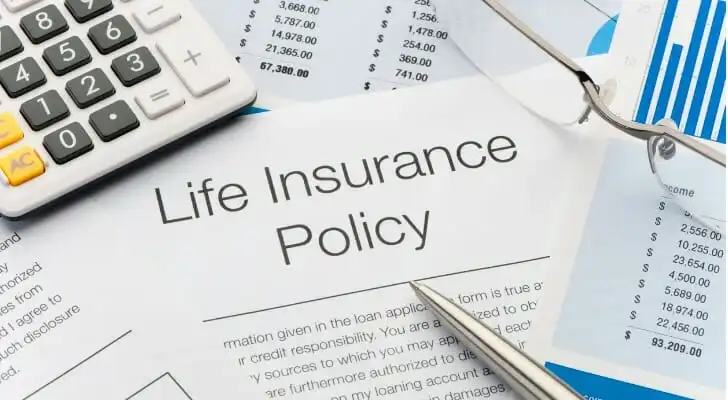 Life insurance can be part of a well-rounded financial plan. But is life insurance an asset? The answer can depend on which type of policy you have. Term life insurance and permanent life insurance offer two very different options for coverage. One can build cash value; the other doesn’t. If you have life insurance or you’re considering buying a policy, it helps to know when it can be considered a financial asset. A financial advisor can offer valuable guidance as you consider your life insurance choices.
Life insurance can be part of a well-rounded financial plan. But is life insurance an asset? The answer can depend on which type of policy you have. Term life insurance and permanent life insurance offer two very different options for coverage. One can build cash value; the other doesn’t. If you have life insurance or you’re considering buying a policy, it helps to know when it can be considered a financial asset. A financial advisor can offer valuable guidance as you consider your life insurance choices.
Life Insurance Basics
Life insurance is designed to pay out a specified death benefit to your named beneficiary or beneficiaries when you pass away. You purchase a life insurance policy from an insurance company. In return for a premium, the insurer maintains your policy’s coverage.
Generally speaking, life insurance falls into one of two categories. You can choose between term or permanent coverage. Term life insurance covers you for a set time period. So you may have a term policy that lasts 20, 25 or 30 years, for example. You pay in regular monthly premiums and once the term expires, your coverage ends.
Permanent life insurance covers you for the entirety of your life as long as your premiums are paid. So you could purchase a permanent life insurance policy at age 30 and still be covered at age 90 as long as your premiums are up to date. Aside from that, there’s one other significant difference between term life insurance and permanent life insurance: Cash value accumulation.
What Is an Asset?
An asset is something of value that you own. Assets are frequently discussed when you’re talking about net worth – meaning the difference between what you own and what you owe. To calculate your net worth, you’d add up all of your assets and all of your liabilities, then subtract liabilities from assets.
Liabilities is another term for debt. So liabilities might include things like:
- A mortgage
- Student loans
- Vehicle loans
- Business loans
- Personal loans
- Credit cards
Assets, on the other hand, are things that hold real value. So your list of assets might include:
- Bank accounts
- A home
- Investment accounts
- Retirement accounts
- Land
- Heirlooms or antiques
- Gold
- Cryptocurrency
When you have more assets than liabilities, you have a positive net worth. On the other hand, you can have a negative net worth if your liabilities exceed your assets.
Is Life Insurance an Asset?
 If you have a life insurance policy, you might be wondering whether it’s an asset or a liability. After all, you might be paying a monthly premium for it. The answer is that yes, life insurance is an asset if it accumulates cash value. So what is cash value? When you purchase a permanent life insurance policy, part of your premiums may be deposited into a tax-deferred savings vehicle. This money can earn interest and grow over time. It’s referred to as cash value since this money may be accessible to you, either by withdrawing it and surrendering the policy or by taking a loan against it.
If you have a life insurance policy, you might be wondering whether it’s an asset or a liability. After all, you might be paying a monthly premium for it. The answer is that yes, life insurance is an asset if it accumulates cash value. So what is cash value? When you purchase a permanent life insurance policy, part of your premiums may be deposited into a tax-deferred savings vehicle. This money can earn interest and grow over time. It’s referred to as cash value since this money may be accessible to you, either by withdrawing it and surrendering the policy or by taking a loan against it.
Cash value life insurance policies aren’t the same in terms of how your money grows. Your options for choosing a cash value policy include:
- Whole life. In a whole life insurance policy, your premiums may stay the same over time. Death benefits and cash value may be guaranteed when the policy is issued.
- Universal life. A universal life insurance policy can offer flexible premiums. But the amount of interested credit to your account may fluctuate over time, so it’s not as easy to estimate how much cash value you’ll accumulate. Some universal life insurance policies may be indexed, meaning that their performance is designed to track or mimic a stock market index like the S&P 500.
- Variable life. With a variable life policy, you can choose which mutual funds you want to invest in. But returns aren’t guaranteed, since the price of those funds can increase or decrease over time, meaning you could lose money.
Regardless of which type of cash value policy you have the interest earnings are tax-deferred. In terms of how you can use this cash value, there are a few options.
You may decide to use the cash value to pay for your policy premiums. That eliminates the need for you to pay anything toward them out-of-pocket. This assumes, however, that your cash value will grow over time and continue earning interest.
Withdrawing cash value may also be an option. The downside, however, is that withdrawing cash value reduces your policy’s death benefit. So if you have a $500,000 policy and withdraw $25,000 in cash value, then your beneficiaries would only receive $475,000 from the policy when you pass away.
Taking a loan instead doesn’t necessarily diminish the policy’s death benefit so long as it’s repaid. The option to take a loan from your policy may be appealing if you’re looking for an asset with high liquidity. It may be easier to access a loan from your policy versus selling off stocks, tapping into an IRA or cashing out certificates of deposit.
When Is Life Insurance an Asset Worth Owning?
Life insurance is meant to provide financial peace of mind for yourself and your loved ones. If you’re a primary breadwinner for your household, for example, you may want to avoid leaving your spouse and/or children in a tight spot financially. So that alone can make paying the premiums for life insurance worth it.
It’s important to remember that term life isn’t an asset, however, in the sense that it has no underlying value you can draw on. While some term life policies may include riders that allow you to tap into the benefit during your lifetime to pay for critical illness or long-term care, that’s different from accumulating cash value. The policy itself doesn’t become more valuable to you over time.
Purchasing permanent life insurance to build cash value could be worth it if you don’t mind paying higher premiums for coverage and you’re looking for ways to fill in gaps in your estate plan. On the whole, permanent life insurance tends to be more expensive than term life. So it’s important to be fairly certain that you need or want to be covered for your lifetime, as it can mean a higher overall cost.
It’s also important to consider how much opportunity your money has to grow when investing cash value. It’s possible that you could earn a higher rate of return by investing your money directly into the market versus allowing cash value to pile up in a life insurance policy. You may also be able to snag a tax break or two if you’re investing to grow wealth inside a 401(k), IRA or similar tax-advantaged plan.
Looking at your entire financial picture can help you decide if life insurance makes sense for you and whether it’s better to choose a term life or permanent life policy. Talking to your financial advisor or an insurance professional can also help with deciding how much coverage you might need.
The Bottom Line
 Is life insurance an asset? It really depends on your individual situation and what you need from a life insurance policy. A permanent policy that builds cash value could be seen as an asset since the policy’s value may increase over time. Cash value life insurance can also be a liquid asset if you need to borrow or withdraw from the policy in a pinch.
Is life insurance an asset? It really depends on your individual situation and what you need from a life insurance policy. A permanent policy that builds cash value could be seen as an asset since the policy’s value may increase over time. Cash value life insurance can also be a liquid asset if you need to borrow or withdraw from the policy in a pinch.
Life Insurance Tips
- Using a life insurance calculator can help you decide how much coverage you need. Once you decide whether term or permanent life insurance makes more sense, you can get life insurance quotes online. Remember that when it comes to cost, term life tends to be more affordable. But the premiums you’ll pay can depend on your overall health and lifestyle as well as the coverage options you choose.
- Consider talking to a financial advisor about whether life insurance is an asset you need to have inside your financial plan. Finding a qualified financial advisor doesn’t have to be hard. SmartAsset’s free tool matches you with up to three financial advisors in your area, and you can interview your advisor matches at no cost to decide which one is right for you. If you’re ready to find an advisor, get started now.
Photo credit: ©iStock.com/courtneyk, ©iStock.com/Drazen Zigic, ©iStock.com/scyther5